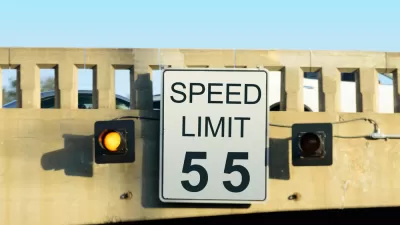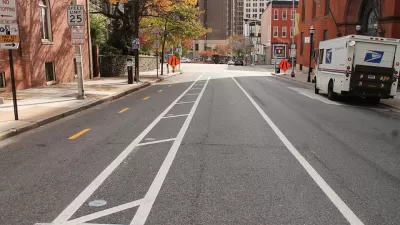Land use regulations provide exhibit A in this indictment of the American legal system's support for a murderous and destructive dependence on automobiles for transportation.

Gregory H. Shill, an associate professor of law at the University of Iowa College of Law, writes for The Atlantic about how the laws and regulations of the United States force Americans to drive.
According to Shill, "over the course of several generations lawmakers rewrote the rules of American life to conform to the interests of Big Oil, the auto barons, and the car-loving 1 percenters of the Roaring Twenties."
"Land-use law, criminal law, torts, insurance, vehicle safety regulations, even the tax code—all these sources of law provide rewards to cooperate with what has become the dominant transport mode, and punishment for those who defy it," writes Shill.
Shill starts the detailing of these claims by focusing on local land use regulations. Other laws relevant to planning, like the 85 percent law used to set speed limits, are also detailed.
The consequences of what Shill calls "auto supremacy" are tragic: "In a country where the laws compel the use of cars, Americans are condemned to lose friends and relatives to traffic violence." Added to the 40,000 people killed and 4 million injured, are the effects of climate change and air pollution.
Shill's writing for The Atlantic previews a larger journal article published in June, titled "Should Law Subsidize Driving?"
FULL STORY: Americans Shouldn’t Have to Drive, but the Law Insists on It

Alabama: Trump Terminates Settlements for Black Communities Harmed By Raw Sewage
Trump deemed the landmark civil rights agreement “illegal DEI and environmental justice policy.”

Study: Maui’s Plan to Convert Vacation Rentals to Long-Term Housing Could Cause Nearly $1 Billion Economic Loss
The plan would reduce visitor accommodation by 25% resulting in 1,900 jobs lost.

Why Should We Subsidize Public Transportation?
Many public transit agencies face financial stress due to rising costs, declining fare revenue, and declining subsidies. Transit advocates must provide a strong business case for increasing public transit funding.

Wind Energy on the Rise Despite Federal Policy Reversal
The Trump administration is revoking federal support for renewable energy, but demand for new projects continues unabated.

Passengers Flock to Caltrain After Electrification
The new electric trains are running faster and more reliably, leading to strong ridership growth on the Bay Area rail system.

Texas Churches Rally Behind ‘Yes in God’s Back Yard’ Legislation
Religious leaders want the state to reduce zoning regulations to streamline leasing church-owned land to housing developers.
Urban Design for Planners 1: Software Tools
This six-course series explores essential urban design concepts using open source software and equips planners with the tools they need to participate fully in the urban design process.
Planning for Universal Design
Learn the tools for implementing Universal Design in planning regulations.
Caltrans
Smith Gee Studio
Institute for Housing and Urban Development Studies (IHS)
City of Grandview
Harvard GSD Executive Education
Toledo-Lucas County Plan Commissions
Salt Lake City
NYU Wagner Graduate School of Public Service





























